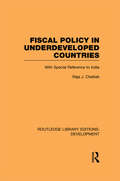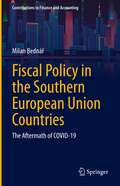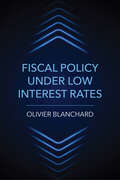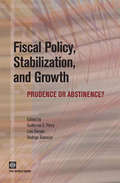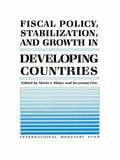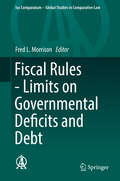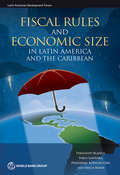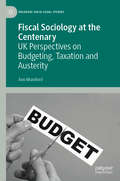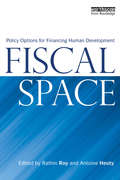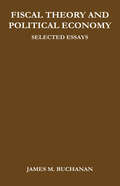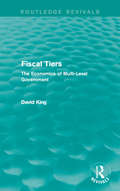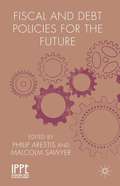- Table View
- List View
Fiscal Policy in Oil Producing Countries During the Recent Oil Price Cycle
by Mauricio Villafuerte Pablo Lopez-MurphyA report from the International Monetary Fund.
Fiscal Policy in Underdeveloped Countries: With Special Reference to India (Routledge Library Editions: Development)
by Raja J. ChelliahOriginally published in 1960, with a second edition in 1969, this book is of special interest for having been the first systematic attempt to discuss problems of fiscal policy from the point of view of promoting economic growth in underdeveloped countries. It deals mainly with problems of tax policy, and outlines the economic principles by which the structure of taxation in developing economies can be constructed and evaluated. The work made a distinct contribution in the field of Development studies by reorienting the theory of fiscal policy originally developed in the economically advanced countries to the problems, requirements and institutional structure of an underdeveloped, over-populated country with a mixed enterprise system.
Fiscal Policy in the Southern European Union Countries: The Aftermath of COVID-19 (Contributions to Finance and Accounting)
by Milan BednářThis book examines public debt hoarding within the Euro Area, which is one of the most complicated challenges regarding modern fiscal policy-making. The author offers an up-to-date analysis of the fiscal situations of Italy, Spain, Portugal, and Greece. The book describes key mechanisms of debt transmission, discusses the potential establishment of fiscal and debt union in the EU, identifies numerous implications, and connects the fiscal positions of the examined countries with the structural flaws of the Euro Area and the monetary policy of the European Central Bank. Moreover, the work presents an estimation of structural budget balances, including a comparison with the estimates of major international institutions such as the IMF, OECD, and European Commission. A separate chapter is devoted to analysing the fiscal policy determinants, using time series since the late 19th century, and the issue of fiscal policy efficiency. Finally, the work provides an overview of debt resolution options. Overall, this book offers eight core chapters intended for the public, professional economists, and policymakers.
Fiscal Policy under Low Interest Rates
by Olivier BlanchardRethinking fiscal and monetary policy in an economic environment of high debt and low interest rates.Policy makers in advanced economies find themselves in an unusual fiscal environment: debt ratios are historically high, and—once the fight against inflation is won—real interest rates will likely be very low again. This combination calls for a rethinking of the role of fiscal and monetary policy—and this is just what Olivier Blanchard proposes in Fiscal Policy under Low Interest Rates.There is a wide set of opinions about the direction that fiscal policy should take. Some, pointing to the high debt levels, make debt reduction an absolute priority. Others, pointing to the low interest rates, are less worried; they suggest that there is still fiscal space, and, if justified, further increases in debt should not be ruled out. Blanchard argues that low interest rates decrease not only the fiscal costs of debt but also the welfare costs of debt. At the same time, he shows how low rates decrease the room to maneuver in monetary policy—and thus increase the benefits of using fiscal policy, including deficits and debt, for macroeconomic stabilization. In short, low rates imply lower costs and higher benefits of debt.Having sketched what optimal policy looks like, Blanchard considers three examples of fiscal policy in action: fiscal consolidation in the wake of the Global Financial Crisis, the large increase in debt in Japan, and the current US fiscal and monetary policy mix. His conclusions hold practical implications for economic and fiscal policy makers, bankers, and politicians around the world.
Fiscal Policy, Stabilization, and Growth
by Rodrigo Suescun Guillermo E. Perry Luis ServenFiscal policy in Latin America has been guided primarily by short-term liquidity targets whose observance was taken as the main exponent of fiscal prudence, with attention focused almost exclusively on the levels of public debt and the cash deficit. Very little attention was paid to the effects of fiscal policy on growth and on macroeconomic volatility over the cycle. Important issues such as the composition of public expenditures (and its effects on growth), the ability of fiscal policy to stabilize cyclical fluctuations, and the currency composition of public debt were largely neglected. As a result, fiscal policy has often amplified cyclical volatility and dampened growth. 'Fiscal Policy, Stabilization, and Growth' explores the conduct of fiscal policy in Latin America and its consequences for macroeconomic stability and long-term growth. In particular, the book highlights the procyclical and anti-investment biases embedded in the region's fiscal policies, explores their causes and macroeconomic consequences, and asesses their possible solutions.
Fiscal Policy, Stabilization, and Growth in Developing Countries
by Mario I. BlejerA report from the International Monetary Fund.
Fiscal Policy: Managing Aggregate Demand
by Robert E. KennedyIntroduces the concept of fiscal policy.
Fiscal Positions in Latin America: Have They Really Improved?
by Jeromin Zettelmeyer Ivanna Vladkova-HollarA report from the International Monetary Fund.
Fiscal Reforms That Work
by C. John Mcdermott Robert F. WescottA report from the International Monetary Fund.
Fiscal Reforms in Low-Income Countries: Experience Under IMF-supported Programs
by George T. AbedIMF-supported Programs
Fiscal Regimes and the Political Economy of Premodern States
by Andrew Monson Walter Scheidel Monson, Andrew and Scheidel, WalterInspired by the New Fiscal History, this book represents the first global survey of taxation in the premodern world. What emerges is a rich variety of institutions, including experiments with sophisticated instruments such as sovereign debt and fiduciary money, challenging the notion of a typical premodern stage of fiscal development. The studies also reveal patterns and correlations across widely dispersed societies that shed light on the basic factors driving the intensification, abatement, and innovation of fiscal regimes. Twenty scholars have contributed perspectives from a wide range of fields besides history, including anthropology, economics, political science and sociology. The volume's coverage extends beyond Europe, the Mediterranean, and the Near East to East Asia and the Americas, thereby transcending the Eurocentric approach of most scholarship on fiscal history.
Fiscal Responses to COVID-19
by Rawi Abdelal Rafael Di Tella Vincent Pons Galit GoldsteinFor the first half of 2020, the COVID-19 crisis seemed on the verge of spiraling out of control. The business world struggled to figure out what COVID meant for macroeconomics. Extended restrictions limiting human interaction meant an end to normal economic production, and a resulting global economic crisis. France, Germany and the United States tackled the economic side of the COVID crisis through complex fiscal policy measures, with differing levels of success.
Fiscal Rules - Limits on Governmental Deficits and Debt
by Fred L. MorrisonThis book examines legal limitations on government deficit and debt and its impact on the ability of nations to provide services to their residents. It studies constitutional and statutory limitations, as well as those imposed by international treaties and other instruments, including those of both the European Union and the International Monetary Fund. The book contains a general report examining the fiscal rules that govern the budgets and expenditures of nation states. The general report is followed by a special report which covers the limits imposed by the European Union and by the smaller group of countries constituting the Eurozone. Ten national reports, describing the limits in their respective countries, form the basis of the general report. These countries include eight members of the European Union (five of which use the Euro and three of which do not), one other European state and one non-European state. The reports include two countries in which constitutional "debt brakes" limit national deficit and debt.
Fiscal Rules and Economic Size in Latin America and the Caribbean (Latin American Development Forum)
by Fernando Blanco Pablo Saavedra Friederike Koehler-Geib SkrokFollowing the collapse of commodity prices in Latin America and the Caribbean (LAC) in 2014-15, many countries in the region were unable to cushion the impact of the shock in order to experience a more gradual adjustment, to a large extent because they had not built adequate fiscal buffers during the commodities’ windfall from 2010-14. Many LAC countries entered 2020 and the COVID-19 crisis in an even more difficult position, with rising debt and limited fiscal space to smooth the negative impacts of the pandemic and adequately support their economies. Fiscal policy in most LAC countries has been procyclical. Public expenditure and debt levels have expanded in good times and contracted in severe downswings due to insufficient fiscal buffers, making crises deeper. Fiscal rules represent a promising policy option for these and other economies. If well-designed and implemented, they can help build buffers during periods of strong economic performance that will be available during rainy days to smooth economic shocks. This book—which was prepared before the COVID-19 crisis—reviews the performance and implementation of different fiscal rules in the region and world. It provides analytical and practical criteria for policy makers for the design, establishment, and feasible implementation of fiscal rules based on each country's business cycle features, external characteristics, type of shocks faced, initial fiscal conditions, technical and institutional capacities, and political context. While establishing new fiscal rules would not help to attenuate the immediate effects of this pandemic crisis, higher debt levels in the aftermath of COVID-19 will demand rebuilding better and stronger institutional frameworks of fiscal policy in LAC and emerging economies globally. Having stronger fiscal mechanisms that include fiscal rules can help countries prepare for the next crisis and should be on the front burner for policy makers in coming years. The findings and lessons discussed apply to economies of different sizes, with some differences under certain scenarios in terms of the technical design and criteria needed for implementation. In this book, policy makers will find that fiscal rules, if tailored to country characteristics, can work and be an essential fiscal tool for larger and particularly smaller economies.
Fiscal Sociology at the Centenary: UK Perspectives on Budgeting, Taxation and Austerity (Palgrave Socio-Legal Studies)
by Ann MumfordThis book discusses the socio-legal tax state and its relationship to development, inequality and the transnational. 'Fiscal Sociology' commenced in 1918 when Joseph A. Schumpeter examined the links between capitalism and taxation, arguing that fiscal pressures on governments led directly to the development of tax collection, and the burgeoning growth of capitalist economies. The identification of taxation as an important component of capitalism has continued to change the way that theoretical sociologists conceptualise tax. This book documents the history of this literature to provide a summary of the topic for scholars seeking a bridge between taxation law and contextual, historical, and anthropological analyses of the development of the state, more generally. Whilst Schumpeter’s insights have been celebrated over the past one hundred years, taxation has slipped from the agenda of many scholarly disciplines, in relation to analyses of poverty, globalisation, and equality. Fiscal Sociology at the Centenary fills this gap. The implications of this literature for taxation law in the United Kingdom, in particular, are considered.
Fiscal Space: Policy Options for Financing Human Development
by Rathin Roy Antoine HeutyWith the deadline for achieving the 2015 Millennium Development Goals (MDGs) less than a decade away, the uneven progress is raising important questions about the ability of the international community to 'scale up' its efforts to finance the goals. Securing adequate financing for development has thus become the most pressing issue of the development agenda. This groundbreaking volume, by leading development economists and practitioners, addresses the central concern for policymakers involved in long term planning for the MDGs: how to create 'fiscal space' for the MDGs and strengthen domestic resource mobilization for human development, while ensuring long-term sustainability and freedom from reliance on aid. By looking at the evidence with fresh perspectives, the authors present a novel approach by which fiscal policy can be made to work for the poor, for the long term. Published with UNDP and Revenue Watch.
Fiscal Stimulus with Spending Reversals
by André Meier Giancarlo Corsetti Gernot MüllerA report from the International Monetary Fund.
Fiscal Sustainability And Competitiveness In Europe And Asia
by Ramkishen S. Rajan Tan Khee Giap Tan Kong YamOver the last two decades the fiscal positions of many advanced economies have deteriorated significantly, leading to ever-growing levels of public debt and mounting concerns about debt sustainability. Fiscal positions are set to weaken further on account of the worsening demographics which are likely to place upward pressure on public social expenditures. This book examines key issues and policy concerns relating to fiscal sustainability and competitiveness in European and Asian economies. In addition to estimating the extent of fiscal capacity or lack thereof for these economies, this book supplements the empirical analysis with country case studies.
Fiscal Sustainability in Remittance-Dependent Economies
by Ralph Chami Amine Mati Yasser Abdih Michael GapenA report from the International Monetary Fund.
Fiscal Theory and Political Economy: Selected Essays
by James M. BuchananThis important collection of eight interrelated essays fills a gap in English-language literature in public finance and fiscal theory. The author consistently emphasizes the central role of collective decision making in fiscal theories as well as the methodological setting in which positive proportions in fiscal theory must be developed.Originally published in 1960.A UNC Press Enduring Edition -- UNC Press Enduring Editions use the latest in digital technology to make available again books from our distinguished backlist that were previously out of print. These editions are published unaltered from the original, and are presented in affordable paperback formats, bringing readers both historical and cultural value.
Fiscal Tiers (Routledge Revivals): The Economics of Multi-Level Government
by David KingFirst published in 1984. This book brings together and develops the economic theory relating to the design and operation of systems of non-central government — positing major developments in several areas. It considers what functions systems most suitably perform in non-central governments, and their appropriate size and structure. How these authorities might finance themselves — by taxes, charges or loans — is analysed in detail. It also examines the use of grants by higher tiers of government and how such programmes should be designed. Concentrating on contemporary economic concerns, it relates the theory to practice in countries such as Australia, Canada, West Germany, the UK and USA.
Fiscal Vulnerability and Financial Crises in Emerging Market Economies
by Michael Kell Richard Hemming Axel SchimmelpfennigA report from the International Monetary Fund.
Fiscal Vulnerability and Sustainability in Oil-Producing Sub-Saharan African Countries
by Robert York Zaijin ZhanA report from the International Monetary Fund.
Fiscal and Debt Policies for the Future
by Philip Arestis Malcolm SawyerThis book offers detailed analysis and informed comment on the future of emerging economic policies. It is essential reading for all postgraduates and scholars looking for expert discussion and debate on the issues surrounding economic policy.
Fiscal and Macroeconomic Impact of Privatization
by Steven Barnett Jeffrey Davis Rolando Ossowski Thomas RichardsonA paper reviewing fiscal and macroeconomic issues in the privatisation of non-financial public enterprises in developing and transition economies.

